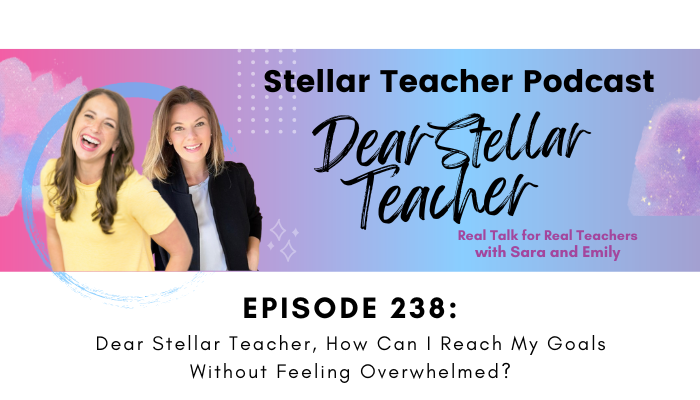
Click play below to listen to ideas and encouragement on how to reach your goals without feeling overwhelmed.
Teaching is full of big goals, high expectations, and never-ending to-do lists—but what if you could make meaningful progress without feeling overwhelmed? In this Dear Stellar Teacher episode, Emily and I are breaking down simple, actionable strategies to help you stay on track, build momentum, and reach your goals without burnout.
We know that so many teachers feel like they’re constantly behind, no matter how much they accomplish. But here’s the truth: you’re not behind—you’re right on time. Today, we’re sharing mindset shifts and practical steps that will help you prioritize, focus on what really matters, and confidently move forward without the pressure of perfection.
If you’ve been feeling like there’s too much to do and not enough time, this episode will help you reset and refocus. Whether you’re looking to improve your literacy instruction, streamline your routines, or simply feel more in control of your workload, we’ve got encouragement and strategies to help. Let’s dive in!
Do you have a burning question you want us to explore on the podcast? Or maybe you have an amazing story that deserves a shout-out? We’d be thrilled to feature your question or stellar story on the show! Simply fill out this form. We can’t wait to hear from you!
In this episode on reaching your goals without feeling overwhelmed, we share:
- A simple mindset shift that will help you stop feeling like you’re always behind.
- Why focusing on one thing at a time leads to bigger and better results.
- How asking “why” five times can help you set more meaningful goals.
- The power of reflection and how to use it to stay on track with your progress.
- Why defining success clearly will help you avoid unrealistic expectations.
- How to find an accountability partner (or create your own system!) to stay motivated.
Resources:
- Join The Stellar Literacy Collective
- Fill out the Dear Stellar Teacher form for a chance to be featured on a future episode.
- Sign up for my Private Podcast: Confident Writer Systems Series
- Sign up for my FREE Revision Made Easy email series
- If you’re enjoying this podcast, please leave a review on Apple Podcasts!
Related Episodes:
- Episode 234, Dear Stellar Teacher: What’s the best way to teach comprehension strategies and skills?
- Episode 229, Dear Stellar Teacher: How can I make a familiar book or resource feel fresh and engaging for my students?
- Episode 225, Dear Stellar Teacher: What Should Grading Look Like in My Classroom?
- Episode 221, Dear Stellar Teacher: How Do I Fit Everything Into My Literacy Block?
Connect with me:
- Email us questions or share a teaching story: [email protected]
- Join my newsletter
- Shop my TPT store here
- Instagram: @thestellarteachercompany
- Facebook: The Stellar Teacher Company
More About Stellar Teacher Podcast:
Welcome to the Stellar Teacher Podcast! We believe teaching literacy is a skill. It takes a lot of time, practice, and effort to be good at it. This podcast will show you how to level up your literacy instruction and make a massive impact on your students, all while having a little fun!
Your host, Sara Marye, is a literacy specialist passionate about helping elementary teachers around the world pass on their love of reading to their students. She has over a decade of experience working as a classroom teacher and school administrator. Sara has made it her mission to create high-quality, no-fluff resources and lesson ideas that are both meaningful and engaging for young readers.
Each week, Sara and her guests will share their knowledge, tips, and tricks so that you can feel confident in your ability to transform your students into life-long readers.
Tune in on your favorite podcast platform: Apple, Google, Amazon, Spotify, Castbox, and more! If you’re loving this podcast, please rate, review, and follow!
Podcast (stellar-teacher-podcast): Play in new window | Download
Sara
Hey friends, welcome back to another Dear Stellar Teacher episode. I love this monthly segment because I get to hang out with my teammate, Emily, as we dive into your questions, share teacher stories, and just chat about things happening in the literacy world. It really feels like we’re sitting down for coffee and chatting in the break room or around our teacher table. So hopefully, you’re excited to join us today. Grab your favorite drink, get comfy, and let’s jump into today’s episode.
Hey Emily, welcome back to the podcast! I always love it when you join me for our Dear Stellar Teacher episodes.
Emily
Hey Sara! I’m so excited about today’s episode. We have such a great conversation planned, so I’m just super pumped.
Sara
I know! But before we jump in, I feel like we always have to have a little book banter, as you call it. What are you reading right now? And are you enjoying it?
Emily
So you inspired my reading this month. I just finished The Unraveling of June Farrow last night.
Sara
What did you think?
Emily
I really liked it! But I’ll admit, because there’s a time travel element, I was a little confused while reading it. I kept thinking, What is going on? So I had to go online and Google some plot explanations to better understand the time travel aspects. And here’s the literacy nerd in me coming out—as I was doing that, I thought, This is why it’s so important for us to preview plot structure with our students! It gives them better access to the text. I was hesitant to look things up because I didn’t want spoilers, but at the same time, I realized I would enjoy the book so much more if I could wrap my head around what was happening in the middle of the plot.
Sara
I love that you did that! I always try to think about my own reading experiences and how we, as teachers, can help students develop authentic reading strategies. So often, classroom reading feels so formal, focused on tests and assessments, but in real life, we do things like look up information to help us understand a book better. You were confused, so you researched it—that’s exactly the kind of real-world reading skill we should be teaching students! I’m glad you enjoyed it.
Emily
Yes, for sure! And the people in my book club make fun of me all the time because I’m always pointing out literary elements in the books we read. I’m like, This is what happens when you work for a literacy company—your brain is just wired this way! Oh, and I also finished The Wedding People, which was another recommendation from you, and that one was really good too! What about you? What are you reading?
Sara
I’m on the Fourth Wing train! Last year, I read Fourth Wing and Iron Flame, and I haven’t started Onyx Storm yet, but it’s next on my list. I’m halfway through Iron Flame, and I told myself I had to finish rereading those before starting the new one. I feel like I’m completely immersed in that world right now. And every time I reread a book, I love noticing all the little details I missed the first time.
Emily
Oh, you mean the foreshadowing?
Sara
Right?! All the hints were there! But even so, I must have noticed them before, but now they really stand out. Like, I just realized how many times she describes Xaden’s eyes as onyx with yellow glints, and suddenly I was like, Oh, that’s why she named it Onyx Storm! It literally took me rereading these books to connect the title to that detail.
Emily
Well, I can’t wait to read Onyx Storm too! I pre-ordered it—apparently twice! I got the Kindle version, and then my husband surprised me with a hardcover from Barnes & Noble. So now I have both, ready to go. But I just feel like I need to be in the perfect headspace to really relax and enjoy it. I’ll get there soon, but right now is not the moment yet.
Sara
Well, I’ll be excited to debrief that book with you whenever we both are on the other side of it.
Okay, well, I’m excited for our conversation today! I know we usually answer a teacher question that we receive, but today’s episode is a little different. We aren’t necessarily answering a specific question, but we are responding to something we observed. Hopefully, our advice today will help teachers listening feel more focused and excited about this semester.
For those of you who may have participated—or even if you didn’t—a few weeks ago, we hosted our Comprehension Reset Challenge. This was the first time we ran this challenge, and shoutout to all the teachers who joined! I’m sure many of you listening were part of that group. It was such a fun week of learning and growing together, and we really focused on what instructional strategies lead to true comprehension.
The way the challenge was set up, we shared four videos and gave teachers an entire week to watch them and implement the strategies we introduced. It was so fun hearing teachers’ reactions, seeing their “aha” moments, and learning about the fluency routines and vocabulary instruction they were working on.
But on the third day of the challenge, a teacher in our Facebook group shared a post. She started by saying, “I am so behind. I just watched the first two videos, and I haven’t had a chance to implement anything yet.” While that sentence was just one part of her post, it really stood out to me because I think it reflects a feeling so many teachers experience—the idea of being behind.
I remember reading that and thinking, Wait a minute, it’s only day three—you’re not behind at all! We’re all just getting started! But to her, it felt like she was so far behind simply because she wasn’t further ahead. And I think a lot of teachers can relate to that. I always felt like I was behind—like I wasn’t keeping up, I wasn’t doing enough. And that feeling can be really exhausting for teachers.
Emily
Yeah, I remember seeing that post, and I think the overall sentiment from our team—and in the comments—was, “You’re not behind. You are right on time.” No matter when you start—whether it’s January or February—whenever you begin setting goals and implementing new strategies, you are right on time. There is no better time than now.
Sara
I think that’s especially true for the teachers who listen to this podcast because I know the teachers tuning in are go-getters. You’re action-takers. You want to improve your instruction—that’s why you show up here each week. You want to implement routines, build your content knowledge, and figure out the strategies that lead to academic growth.
But the challenge is, when we try to do all of these things, it can lead to overwhelm. I don’t know about you, Emily, but I always had a to-do list that was a mile long. Even though I was knocking things off my list and making progress, I still felt like no matter how much I did, it was never enough. There was always more I should be doing, and I constantly felt like I was falling behind.
Emily
Yeah, and for me, I have this personality where I always want to be ahead. So if I wasn’t ahead, I felt like I was behind—and that mindset is just so toxic.
Sara
Absolutely. And honestly, it probably took me five or six years of teaching to realize that there’s no such thing as being ahead in education. Even if you get ahead on lesson plans, reading a book, or preparing materials, there’s always going to be something new that comes up that you have to figure out.
That’s why, in today’s episode, we want to help teachers shift their mindset. We’re still so early in the year, and so many teachers have big goals, big dreams, and things they want to accomplish in their classrooms. So we want to share some really practical, easy steps that can help you make forward progress.
You can transform your literacy block into something amazing that leads to incredible academic success—without burning yourself out or feeling like you’re constantly behind. That’s really what we’re going to focus on today.
So, Emily, I’m going to let you kick things off. What would you say to teachers who want to make progress but feel overwhelmed? The ones who are thinking, “If I’m not ahead, I’m behind. There are too many things I want to do—where do I even start?”
Emily
Yeah, this is a topic I am so excited to talk about! First of all, let me mention that having a growth mindset and setting goals is something that truly means so much to me. I mean, raise your hand if you’ve ever taught a growth mindset lesson to your students—I think we all have! We preach growth mindset to our students all the time, but I started to ask myself, How are we modeling that for them?
Growth mindset is a core value here at The Stellar Teacher Company, and it’s something I’m passionate about for sure—and I know you are too, Sara. So I’m really excited to share some practical and big-picture tips for crushing your goals.
Also, let me just say, I’ve had a personal revolution when it comes to goals. I remember just last year telling my husband, “I am not a goal-oriented person, but I want to be.” I remember sharing that with you too, Sara. But then I had this realization where I was like, Wait, yes, I am! I am a goal-oriented person! It was just this false narrative I had been telling myself. Since then, I’ve had such a mindset shift.
So my first tip for implementing goals is to focus on one thing at a time. This is actually something we do on The Stellar Teacher team, and what I love about it is that even if your goal feels really big and overwhelming, when you peel it back to just one thing, you can become really good at that one thing.
Let me give you a personal example. Last year, I had this idea that I wanted to improve the overall quality of my work. Now, that’s a huge goal, and I had to ask myself, How am I actually going to do that? So I decided to focus on improving my ability to concentrate while working. Since I’m a curriculum creator for The Stellar Teacher Company, I spend a lot of time writing and developing resources. I realized that if I could improve my focus while working, it would naturally lead to an improvement in my overall work quality. So I spent time researching focus strategies, learning how to be fully present, and figuring out ways to eliminate distractions. I basically focused on my focus.
Now, let’s say you’re a teacher—hopefully, you are if you’re listening to this!—and you have a goal like, “I want to be better. I want to improve student outcomes. I want to raise test scores. I want my students to learn more.” Those are great goals, but they’re really broad. So you have to bring them back to one specific thing.
For example, let’s say your goal is to improve your students’ comprehension. That’s still broad, so you break it down further: “I’m going to focus on building background knowledge.” Then, you look for professional development related to background knowledge. You set a specific time frame, like “By the end of the quarter, I want my students to improve their background knowledge.”
When you focus on just one thing, it makes your goal so much more attainable. It becomes something you can actually crush.
Sara
I love that! And honestly, when I was in the classroom, this approach would have been so helpful. I was that teacher who was trying to improve everything at once—small group instruction, test scores, classroom management. I was trying to do all the things at the same time!
But like the saying goes, “If you try to improve everything at once, nothing improves.” There is so much power in zooming in on just one focus area. And I love how you said, “I wanted to improve the quality of my work,” but even that was too broad. So you had to dig deeper and ask yourself, “How am I actually going to do that?”
Focusing on one thing also alleviates the pressure of feeling like you have to do everything all at once. It reminds teachers that they can do all the things—they just can’t do them all at the same time. So instead, pick one thing to focus on, stick with it for a while, and then move on to the next thing on your list.
Emily
Exactly! And the great thing is, once you get really good at something, it just becomes part of your teaching. It turns into a habit—both for you and for your students. Then, once it’s second nature, you can shift your focus to something new—just like you said!
Sara
Yeah, and okay, so my first thing that I wanted to share is similar to that, and I think it’s important for teachers to really reflect on why the goal they’re working on is so important. You can do this by simply asking yourself, Why is this a goal?
I remember a few years ago, I was at a boot camp workout class, and our instructor had us do this exercise. She asked, Why are you at this workout? We had to either tell a neighbor or say it out loud, and then we had to do a bunch of burpees. After that round, she asked again, Okay, why is that important?
For me, I initially said, I’m at this workout because my friend invited me. Then she told us to take that last thing we said and ask ourselves why that was important. So I thought, Well, why is it important that my friend invited me? And I realized, It’s because she values fitness, and I value fitness too, so I wanted to come. Then we did more burpees, and she asked again, Why is that important? She just kept going with the why questions.
I’ve seen this concept in a few different places, but the idea is that by asking yourself a series of five why questions, you really distill down to the core reason why something matters.
I think it’s so valuable to question and reflect on why you’re putting so much time and energy into a goal. As you go through this process, you might realize that something you thought was a priority actually isn’t that important to you or your students. Or maybe you realize it’s a school initiative you’re not really bought into, so it doesn’t need to be your personal priority. Or maybe you discover that you’re only working toward a goal because you’re comparing yourself to another teacher across the hall—and you can let that go.
So before you go all-in on a goal, take the time to ask yourself: Why do I feel like this is important? How is this going to benefit my students? Then go even further and ask, Okay, but why is that important? Keep digging deeper. The more you ask why, the clearer it will become whether this is truly something you want to work toward—or if it’s something you can cross off your list and free yourself from.
Emily
Yeah, that is great advice because the goal has to be personal to you, or else you’re not going to feel motivated to achieve it. What you described from that workout class sounds like an exercise designed to inspire you to push toward your next goal—whether it was more burpees or something bigger.
I really love this idea of getting to the core of why you’re doing something, because that is what creates motivation.
Sara
Yeah, and if you’re truly motivated, the why becomes powerful. If you ask yourself a series of why questions and realize, I need to improve my word study or word recognition knowledge because I have students in my class who don’t know how to read, and I need to teach them how to decode. If they don’t learn it in fourth grade, they might not learn it in middle school, that’s incredibly motivating.
But if your goal is something like, I need to update this bulletin board because I want it to look nice, that’s a much more surface-level reason. Reflecting in this way helps you determine which things truly matter and which things you can let go of.
Emily
Yeah, that’s such a great reflection. And speaking of reflection, my next big idea is to be reflective.
Some of you might hear this and roll your eyes, because I know that reflecting on your goal progress can feel tedious. But for me, being intentional and reflective about my progress has been the key to my growth.
Since I’m a chatty Cathy and a self-proclaimed social learner, my favorite way to reflect is through conversation. For me, that person is you, Sara. I get to use you as an accountability partner, and I talk through my progress on my goals with you.
I really, really hope that everyone listening has someone in their life who can serve as an accountability partner—someone you can share your goals with, set intentions alongside, and check in with regularly.
So when Sara and I meet to reflect on our goals…
Sara
…which is one of my favorite things to do, by the way.
Emily
Yeah, like I said, growth mindset is a big part of our team. When we meet, we really talk about things like, On a scale of one to ten, how are we doing in making progress toward our goal this quarter? Then we discuss what specific progress we’ve made and what else we can do to reach our goal.
I really hope you have someone you can have that kind of conversation with. But if you don’t, I have another little tip that can help you stay reflective and provide a helpful reminder.
Check in with yourself. One way to do this is to schedule an email to yourself—maybe once a month or at the end of each week on a Friday. You can type out a few key reflection questions in the email, so when it arrives a couple of weeks later, you’ll have a built-in reminder to reflect on your progress.
It’s really important to take time to reflect because it allows you to check in with yourself, assess your progress toward your goal, and think critically about what you’ve already accomplished and what you still need to do to move forward.
Sara
I love that encouragement! We talk about this a lot on our team—how we know reflection is important, yet so often, we don’t actually make time for it.
Someone on our team recently shared that she’s trying to prioritize more reflection. She realized that when she takes the time to reflect—whether at the beginning or end of the week—it helps her clarify what she needs to work on. Before, without that reflection, she would just plow through her to-do list without pausing to think about the next steps.
I feel like that reflection piece is so crucial. I want to share a couple of ideas because, like you said, having accountability and working with other people is so huge.
I was lucky to have a coworker I considered a teacher bestie. We were completely aligned in our goals—we both wanted to grow, improve, and move forward. It was easy to reflect with someone like that in my building.
But I know not every teacher has that. Sometimes, you might be on a team where you’re striving for growth more than your teammates are, and that can feel tricky. That’s where I think online communities can be really valuable. Whether it’s a teacher you connect with on Instagram, someone in a Facebook group, or a community like ours, there are so many ways to find support.
That’s one of the reasons teachers in our membership love the community aspect—because they can connect with other educators who are also in the trenches, working toward similar goals. Whether it’s fluency instruction, implementing more consistent routines, or improving classroom management, it helps to have a support system.
So if you don’t have someone in your building, find a friend online. And if you need a friend online, we will be your online friends! You can reach out to us on Instagram—we’ll encourage and support you and help you stay reflective. That community piece is huge when it comes to making progress toward your goals.
Emily
Yes, for sure! I love that. If you’re a current member of The Stellar Literacy Collective, let us know what goals you’re working on inside our Facebook group! We would love to hear from you and cheer you on as you continue working toward them.
Sara
Absolutely! The other thing I was thinking about while putting together my list of things to share with teachers…
Emily
Wait, hang on. Are you saying you came up with more than two? Or is this your first one?
Sara
I’ve only shared one so far!
Emily
Okay, okay, sorry!
Sara
When Emily and I were planning this episode, we both made our own lists but didn’t share them with each other ahead of time. So I have no idea what she’s going to say, and she has no idea what I’m about to say. And actually, what I’m about to share might involve her, so I hope she’s okay with it!
One thing I think is really helpful when working toward a goal is getting crystal clear on what success actually looks like.
So many teachers are perfectionists and people-pleasers with very high standards for themselves. Because of that, they can set goals that either become a moving target or are completely unrealistic.
It’s important to clearly define what success looks like for a particular goal. For example, if a teacher says, I want to improve my small group instruction, they need to break it down and list out all the ways they could measure success in that area.
The problem is, a lot of times, we hyper-focus on one specific metric. A teacher might think, If I want to improve my small groups, I need to meet with every single group every single day. But that’s an unrealistic expectation. If that’s their only measure of success, they’re never going to feel like they’re making progress.
Instead, success could look like increasing student engagement in small groups, differentiating more effectively, encouraging more student-led discussions, or implementing independent book clubs. There are so many ways to track progress, but if a teacher hyper-focuses on just one unrealistic expectation, they might miss all the other ways they are actually growing.
And this reminds me of a conversation you and I had about attention to detail. Do you mind if I talk about that a little bit?
Emily
Go ahead.
Sara
So one of the things we were talking about, and one of the goals you were working on last quarter, was your attention to detail. You said, I just don’t feel like I have good attention to detail, but from my perspective, I see the resources you create—they’re beautiful, they’re amazing, and they’re so thoughtful.
At one point, I asked you, Okay, well, what does it mean to you to have attention to detail? And you said, Not making any mistakes. And I was like, That is unrealistic, right? The idea that you will never, ever make a mistake—mistakes are just part of being human.
I think after we had that conversation—correct me if I’m wrong—you started to realize that attention to detail is more than just avoiding mistakes. It’s about being thoughtful with content, considering design, researching carefully, thinking about ease of use, and keeping both the teacher’s and student’s perspectives in mind. All of these things contribute to attention to detail, and they have nothing to do with whether every sentence has a period at the end or whether every word is spelled correctly.
I think so many of us get caught in the trap of hyper-focusing on one small aspect of a goal while failing to realize how many other elements contribute to it.
Emily
Yeah, my attention to detail renaissance, as I call it. But you’re so right—it’s about being really clear on what the goal actually looks like. What will it look like when I reach it? How do I want to feel at the end of the quarter or the end of the month?
I had such a warped idea of attention to detail. I thought it meant being a perfectionist—no mistakes, no corrections from an editor, no feedback at all. But now, when I work on resources—like our recent assessment project—I find myself thinking, What would a parent say if this question came home on their child’s test and was unclear?
And that’s where I realize, Wow, my attention to detail has really improved.
Sara
Right? That shift in thinking is so important. You talk about your attention to detail renaissance, and now, when you sit down to work, you have so much more confidence in your attention to detail compared to how you felt last fall when you thought you had none. So how has that shift impacted your work and your output?
Emily
I just feel so much more confident. I’m not afraid to take risks or try different things. Now, I have this constant thought in my head: How can I level this up? And to me, that’s what attention to detail really is now.
Sara
Yes, for sure! And I think you highlighted something really important for teachers to keep in mind—the narrative we tell ourselves has such a huge impact on the actions we take.
If you’re a teacher constantly telling yourself, I’m behind. I’m not doing enough. I’m overwhelmed. I have so much to do and I’m getting nothing done, then you’re going to feel frustrated, exhausted, and unmotivated. And who wants to take action when they’re feeling like that?
But if you recognize the progress you’re making, feel confident in what you’ve accomplished, and celebrate small wins, you’re going to be so much more motivated to keep working.
So do yourself a favor—flip that script in your head. Start recognizing the progress you are making instead of focusing only on what’s left to do.
Emily
100%! I love that because mindset is so important in everything we do. Everyone wants to feel successful at their job. Everyone wants to feel confident in their work. And for teachers, especially, I know there’s so much pressure to do well for their students all the time.
I hope that teachers take what we’ve talked about today and use it as motivation to grow and improve. When we set goals and actually reach them, we just feel happier overall.
Sara
Yes! We’re so excited for all the things you’re working on. We know that because you listen to this podcast, you’re a go-getter. You’re the kind of teacher who’s thinking, I’m going to make things happen.
Don’t let that massive to-do list in your brain stop you from taking forward action—even if it’s just in one small area.
And like Emily said, let us know what you’re working on! Whether it’s inside The Stellar Literacy Collective Facebook group or over on Instagram, we’d love to cheer you on this semester.
All right, we’ll see you back here next Monday. And Emily, I’ll see you in March!
Emily
All right—have a great week!

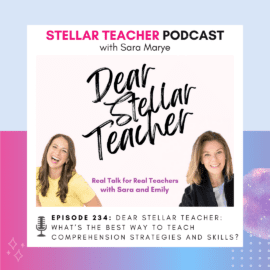


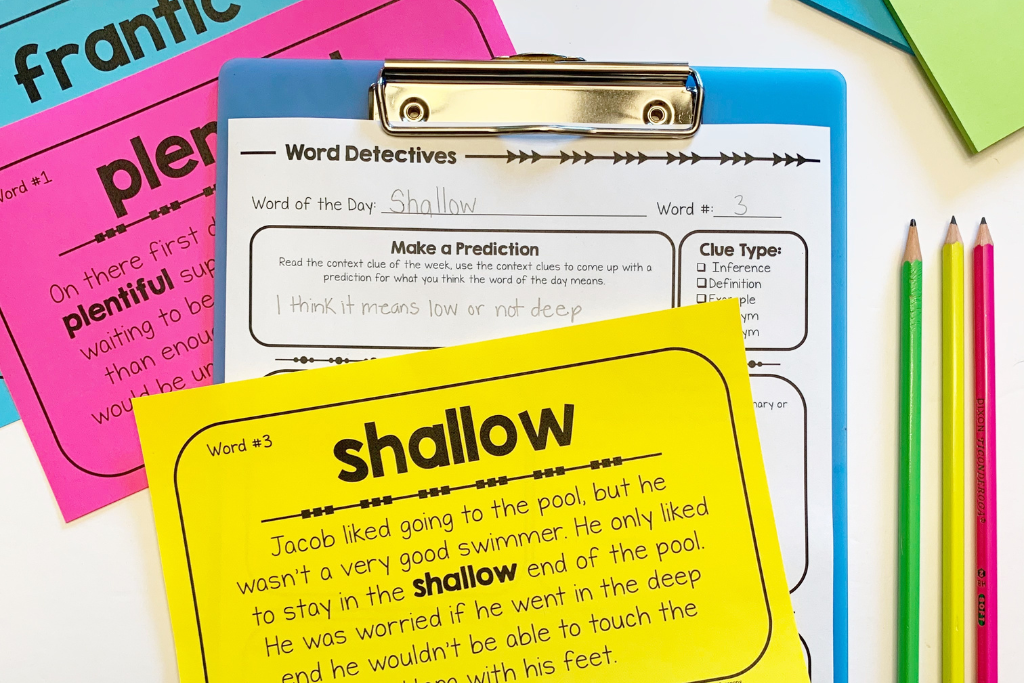

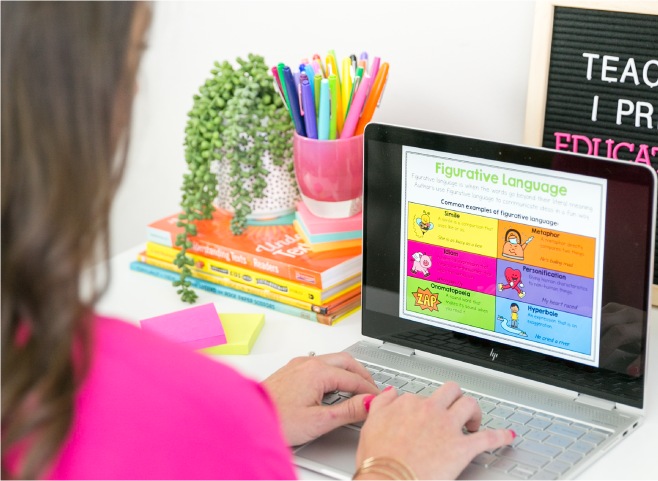
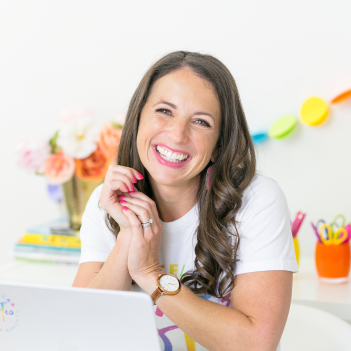
Leave a Comment
You must be logged in to post a comment.